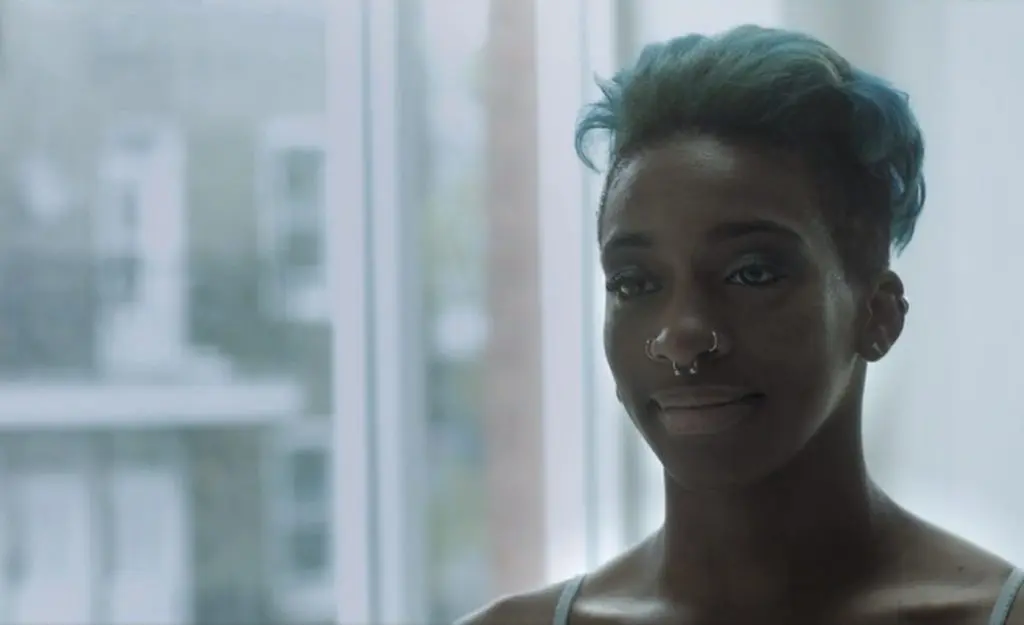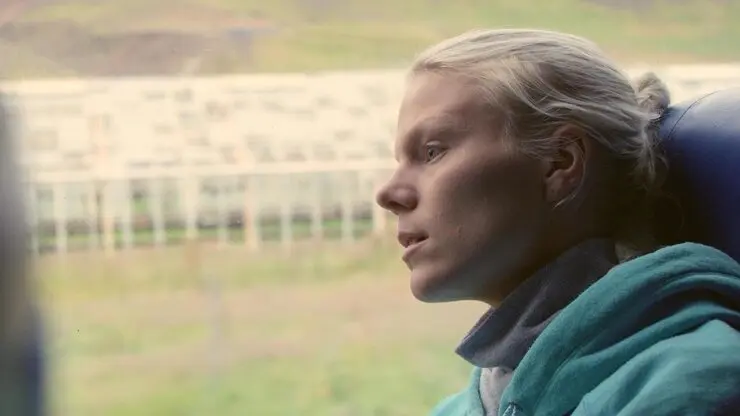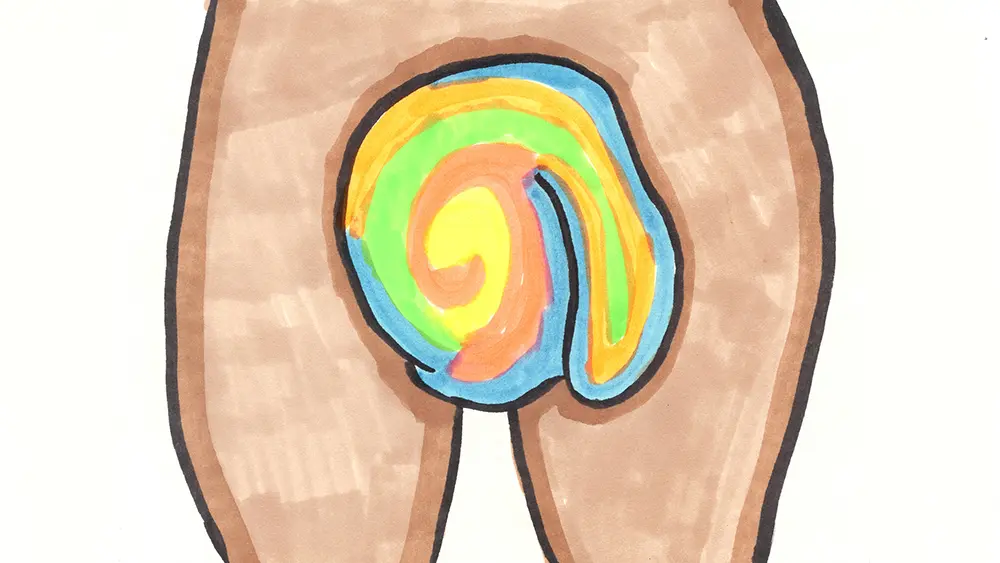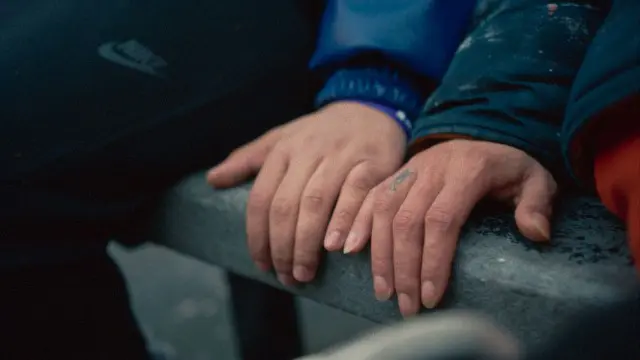After yesterday’s animated delights, I simply couldn’t resist this forty-minute programme of short films with a common theme of happy endings. As Denise Blackman shares in the introduction, “queer people live with the constant threat of stigma, discrimination, abandonment, broken relationships, transphobia, homophobia, mental health aggravations and the whole gamut of issues.” So it’s a welcome breath of fresh air to watch these powerful films that may touch upon those issues, but with an underpinning message of encouragement.
This programme also highlights the way LGBTQ+ issues are rarely straightforward, by embracing the intersection with race, culture, gender, etc. A wide range of backgrounds, languages, and gender and sexual minorities are presented in these five films… and they are all lit with a spark of hope or humour.
Zaya

(dir Susanne Serres, Canada, 2017)
Zaya is a short film promoting love and acceptance. The main protagonist, named Zaya, is a contemporary dancer that just realized her attraction for Nadège, her dance partner.
Zaya expresses herself through dance but doesn’t entirely accept her own attraction towards women. It’s only when she can be honest with her own mother about her sexuality that she can feel comfortable about it enough herself. Zaya is a beautiful demonstration of the way acceptance can come from others and from within; and one of those can enable the other.
I loved the camera work here, getting in close to the dancers and relishing their mutual movement. And I loved Zaya’s mother: knowing, without pressure, and supportive in exactly the way a parent can be.
This one is available to watch online.
ÉG AKA I

(dirs Vala Ómarsdóttir and Hallfríður Tryggvadóttir, Iceland/Lithuania, 2019) a moving yet exhilarating drama, following a trans teen woman breaking away from societal expectations after a visit to a gender identity clinic.
ÉG is striking in its contrast to Zaya: in this film, Svanur must find self-acceptance before being herself in front of her mother. This came via brief scenes of growing joy and contentment; and one painful visit to a doctor, who recognized gender only from the data output of checkboxes. At college, Svanur seemed most comfortable in the swimming pool (I guess one can lose sight of the details of one’s body when enveloped in water), and on a night out with a friend, she embraced the euphoria of presenting as female.
This one really touched me deeply, in one sentence and two scenes. The sentence, spoken by her close friend, was “You don’t need any doctor to tell you who you are.” Svanur needed that, needed that validity and to hear that she already had her own identity, waiting to be lived. The night out they spent dancing was tremendous: that was the first time we saw Svanur smile, being herself and celebrating. Then the closing scene made me absolutely and unexpectedly blub.
This one too is available to watch online.
Dix Pix

(dir Steven Fraser, UK, 2019)
Dix Pix is a short animated documentary that looks at the gay male/trans/non-binary body and why it is common for people to send naked pictures via dating apps.
This one is different, in two respects: all the content is drawn from real people, and it is presented via experimental animation. “Dick pics” were received on a dating app and the senders interviewed about their reasons and feelings behind them, with the pictures redrawn in glorious color. Many kinds of people with penises are represented here and some fascinating insights into what it is like to own a penis and show it off, whether it’s one they are born with, one they are proud of, or indeed any circumstance.
Personally, I’ve never understood the interest in sharing such pictures, but I’m now partway towards understanding why it happens on Grindr. The interviews cover a remarkable range of topics (especially considering the film’s short duration): masculinity, body positivity, feeling wanted, gender identity, etc. Oh, and it’s very entertaining.
The Bassinet

(dir: Tiffany Hsiung, Canada, 2019)
When a vintage bassinet appears at filmmaker Tiffany Hsiung and long-time fiancée Victoria Mata’s home, it sets off a chain reaction of emotions.
The Bassinet is an autobiographical piece in the form of snapshots and narration about a – yes – bassinet (not a crib) which triggers something unexpected for the filmmaker. Her Chinese heritage meant that she felt destined to face certain expectations with regard to children, which may be difficult to align with her same-sex relationship.
Hsiung made this film for the 5@50 project, which marked the fiftieth year since homosexuality was decriminalized in Canada. She wanted to tell a story from her particular perspective because it is underrepresented: the conflict she sometimes felt between being gay and being Chinese surely isn’t a unique story. The style used for this short film, almost like she and her fiancée Victoria were looking over an old scrapbook, was very apt: there is hope to be found in knowing they are together and got through this trying period; and hope that in facing – in advance – the complexity that parenthood could bring, they might find they are ready if a baby joins them.
Baby

(dir Jessie Levandov, USA, 2019)
Baby is a queer coming-of-age love story that confronts themes of LGBTQ identity and toxic masculinity.
A day in the life of Ali, a Dominican teenager in the Bronx: a touching film about streetwise young men is not something you’d expect from a female director. She plays upon expectations and stereotypes while embracing the urban setting and youth lifestyle with obvious affection.
Ali is a fascinating young man to watch: he is aware of a connection that might be worth pursuing, but also aware of expectations and assumptions that surround him. It would be fairly easy for him to simply follow those expectations, so having briefly got to know him, I was truly proud and hopeful when he chose to step out of his pigeonhole. I was doubly pleased for him, and moved when his approach was well-received; I have to wonder where a relationship would go from here in his world, but such boldness can only bode well.
What did you think of Happy Endings? Comment below.




